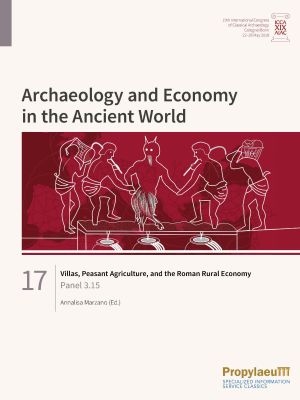
Zitationsvorschlag
Lizenz

Dieses Werk steht unter der Lizenz Creative Commons Namensnennung - Weitergabe unter gleichen Bedingungen 4.0 International.
Identifier
Veröffentlicht
Villas, Peasant Agriculture, and the Roman Rural Economy
Panel 3.15
Die römische Villa war ein prägendes Element der römischen Welt, dessen Aussehen und Verbreitung in den Regionen Italiens und darüber hinaus mit verschiedenen historischen Phänomenen in Verbindung gebracht wurde: Die territoriale Ausdehnung Roms, die Errichtung von Kolonialstädten und die Bereitschaft der einheimischen Eliten, an Formen römischen Lebens teilzunehmen. Während die traditionelle Geschichtsschreibung die zunehmende Ausbreitung großer Villen in Italien während der Republik als ein Phänomen ansah, das kleine und mittlere Landbesitzer vom Land verdrängte und damit zu den sozio-politischen Problemen Roms beitrug, haben neuere Studien gezeigt, dass große Villen und Bauernhöfe nicht im Widerspruch zueinander standen. Die in diesem Band gesammelten Artikel versuchen, eine organischere Bewertung der Funktionsweise der "Villenwirtschaft" und der "bäuerlichen Wirtschaft" zu erreichen und zu untersuchen, inwieweit - wenn überhaupt - die beiden Wirtschaftsweisen ineinander integriert waren. Dies wird durch die Beantwortung zweier Hauptfragen erreicht: ob Villen und kleine und mittlere Bauernhöfe Teil von zwei unterschiedlichen Produktions- und Verteilungssystemen waren oder nicht; und inwieweit das Bild, das sich aus den Provinzen ergibt, mit der Situation im römischen Italien verglichen werden kann.






